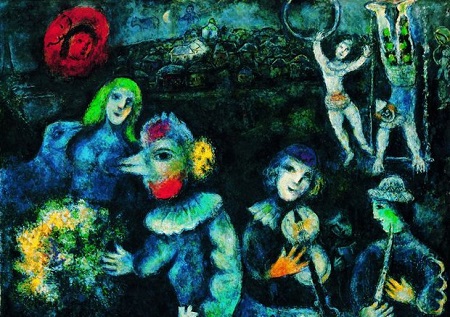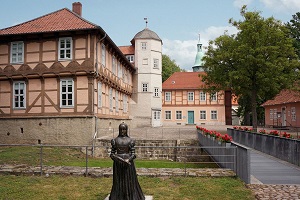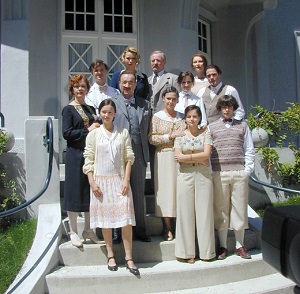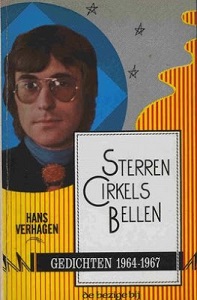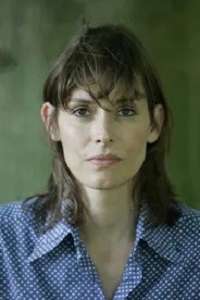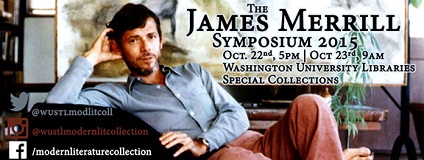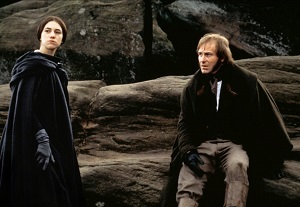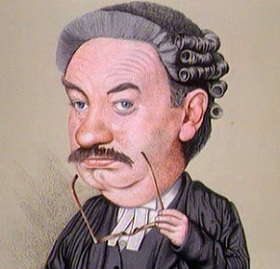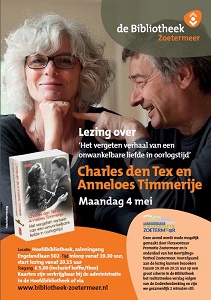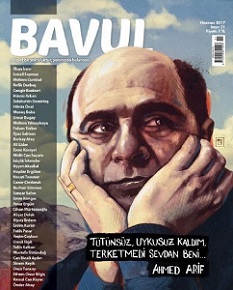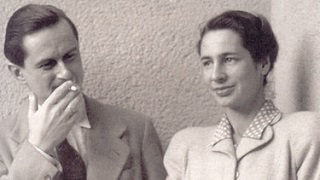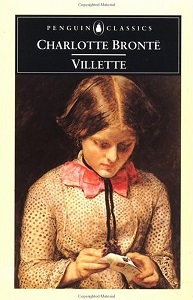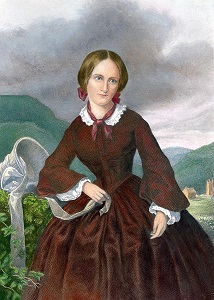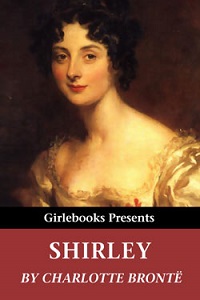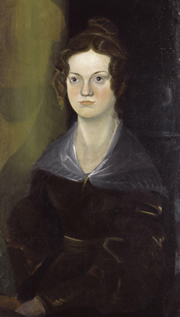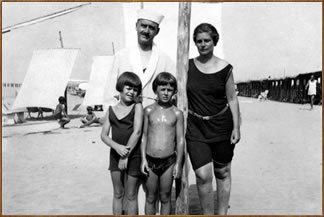De Britse schrijfster Charlotte Brontë werd geboren in Thornton op 21 april 1816. Zie ook alle tags voor Charlotte Brontë op dit blog.
Uit: Shirley
“Mr. Sweeting is mincing the slice of roast beef on his plate, and complaining that it is very tough; Mr. Donne says the beer is flat. Ay, that is the worst of it: if they would only be civil Mrs. Gale wouldn’t mind it so much, if they would only seem satisfied with what they get she wouldn’t care; but “these young parsons is so high and so scornful, they set everybody beneath their ‘fit.’ They treat her with less than civility, just because she doesn’t keep a servant, but does the work of the house herself, as her mother did afore her; then they are always speaking against Yorkshire ways and Yorkshire folk,” and by that very token Mrs. Gale does not merely the humble appendages.” There was a certain dignity in the little elderly gentleman’s manner of rebuking these youths, though it was not, perhaps, quite the dignity most appropriate to the occasion. Mr. Helstone, standing straight as a ramrod, looking keen as a kite, presented, despite his clerical hat, black coat, and gaiters, more the air of a veteran officer chiding his subalterns than of a venerable priest exhorting his sons in the faith. Gospel mildness, apostolic benignity, never seemed to have breathed their influence over that keen brown visage, but firmness had fixed the features, and sagacity had carved her own lines about them. “I met Supplehough,” he continued, “plodding through the mud this wet night, going to preach at Milldean opposition shop. As I told you, I heard Barraclough bellowing in the midst of a conventicle like a possessed bull; and I find you, gentlemen, tarrying over your half-pint of muddy port wine, and scolding like angry old women. No wonder Supplehough should have dipped sixteen adult converts in a day — which he did a fortnight since; no wonder Barraclough, scamp and hypocrite as he is, should attract all the weaver-girls in their flowers and ribbons, to witness how much harder are his knuckles than the wooden brim of his tub; as little wonder that you, when you are left to yourselves, without your rectors — myself, and Hall, and Boultby — to back you, should too often perform the holy service of our church to bare walls, and read your bit of a dry discourse to the clerk, and the organist, and the beadle. But enough of the subject. I came to see Malone. — I have an errand unto thee, 0 captain!” “What is it?” inquired Malone discontentedly. “There can be no funeral to take at this time of day.” “Have you any arms about you?” “Arms, sir? — yes, and legs.” And he advanced the mighty members. “Bah! weapons I mean.” “I have the pistols you gave me yourself. I never part with them. I lay them ready cocked on a chair by my bedside at night. I have my blackthorn.” “Very good. Will you go to Hollow’s Mill?” “What is stirring at Hollow’s Mill?”

Charlotte Brontë (21 april 1816 – 31 maart 1855)
Cover
De Franse schrijver Patrick Rambaud werd geboren op 21 april 1946 in Parijs. Zie ook alle tags voor Patrick Rambaud op dit blog.
Uit: L’Absent
« L’Empereur se resigna. Aprås un jour de diåte, laissant å Bassano et å Caulaincourt le soin d’arranger les etapes de son voyage, il se refugia dans les livres. Enferme, de son cabinet de travail dont il ne sortait plus qu’å peine, il organisa le pillage de la bibliothåque du chåteau, etablissant une liste des auteurs å emporter en exil, Cervantås, Fenelon, La Fontaine, Voltaire, son cher Plutarque dans la traduction de Jacques Amyot, une collection du Moniteur universel. L’Empereur feuilletait, compulsait, annotait, marquait des pages, triait lui-måme les volumes qu’on mettait en caisses, et parce que les libraires habituels de Fontainebleau avaient detale, Octave fut designe pour seconder le comte Bertrand dans cette tåche distrayante, car il avait des lettres. Si Napoleon continuait å ddplier des cartes, ce n’etait plus pour disposer des troupes dans un repli de terrain mais pour se pencher sur des repkes geographiques. Il leva les yeux et demanda : — Connaissez-vous cette ile, messieurs ? Y a-t-il un palais ? un chåteau ? une habitation convenable ? passable ? — Nous savons juste la situer, sire. — Montrez-moi, Bertrand, je ne la trouve pas… — Le comte Bertrand indiqua de l’ongle un point perdu en mer å cöte de la Corse. — On dirait un puceron. — C’est pourtant d’Elbe. — Une ? Un rocher, oui. Napoleon faisait la moue, ses lorgnons sur le nez et le nez cone contre la carte de la Mediterranee. — La cöte semble proche, dit-il. — Piombino est å environ trois ou quatre lieues d’Elbe. Voyez, sire… — Je vois les rivages de la Toscane. Ces gens ne m’aiment guåre, ils pleurent encore leur grand-duc Leopold. Ils vivent dans un jardin mais je les sais hostiles. — Ils sont aussi rebelles que couards, Votre Majeste n’a pas å s’inquieter. — He! mon royaume n’est pas si loin de Rome… — A quarante-cinq lieues, eri effet, et Naples å quatre-vingt-cinq. — Voilå qui nous ouvre des perspectives… L’Empereur avait souri et il mordillait en re’vant le manche de son lorgnon. Il battit des mains quand Octave lui presenta un fascicule qu’il venait de denicher au fond d’un rayon, Notice sur d’Elbe, par un auteur anonyme, et, surtout, le recent Voyage å d’Elbe d’Arsåne Thebaut, plus complet. « A la bonne heure ! dit-il. Apprenons notre royaume ! »
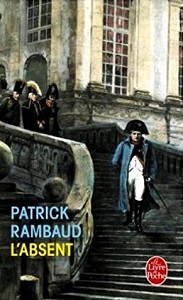
Patrick Rambaud (Parijs, 21 april 1946)
Cover
De Nederlandse schrijver Charles den Tex werd geboren in Box Hill, Australië, op 21 april 1952. Zie ook alle tags voor Charles den Tex op dit blog.
Uit: De vriend
“Slapen deed ze overdag en korter dan ze zou willen. Twee nachten zat ze al in het hok. Af en toe kon ze even naar buiten om lucht te krijgen, maar het merendeel van de tijd bracht ze door in een kleine ruimte met een grote hoeveelheid apparatuur en twee mannen: Kris de Roode en Wim ’t Man. Haar noemden ze Pop, Wijffie, Schat, Professor, Mevrouw of wat er maar in ze opkwam. Meestal noemden ze haar M, omdat ze zo heette, Emma. De bijnamen waren hun manier om de gein er een beetje in te houden, dat begreep ze wel, al was het af en toe knap vermoeiend, zo veel humor.
‘Is dat alles, Pop?’ vroeg Wim.
Ze knikte, de koptelefoon nog op haar hoofd. ‘Ik hoor niets meer.’
Wim draaide zijn stoel de andere kant op, naar Kris. ‘Zijn ze naar buiten?’
Kris keek naar een monitor die aan de wand hing. Bij hoge uitzondering hadden ze toestemming gekregen om één camera op te hangen zodat ze tenminste een beeld hadden van de mannen die naar binnen gingen en naar buiten kwamen. Het beeld was zwart-wit, niet overdreven scherp en statisch. Ze konden de camera niet bedienen. Op de monitor was de voordeur van het pand te zien. Kris schudde zijn hoofd. ‘Nog niet.’
‘Ik hoor ze op de gang’, zei Emma.
Ze wachtten. Emma met de koptelefoon op, Kris kijkend naar de monitor. Het bleef voor haar een vreemde gedachte dat zij hier zaten te luisteren naar drie mannen aan de andere kant van de muur die daar bijeenkwamen om te praten, te overleggen, afspraken te maken, te vertellen wat ze hadden gedaan of niet hadden gedaan, om plannen te maken. Meestal hadden ze het over gewone dingen of ze hadden ruzie, op hun manier. Ruzie met hun vriendin, met een vriend, met hun vader, er was altijd wel iemand die iets niet goed deed. Tussendoor hadden ze het over wapens, over kogels en messen. Die nacht ging het vooral over een mislukte afspraak. Er had een geldoverdracht moeten plaatsvinden en er was niemand komen opdagen. Ergens was iets fout gegaan, zonder geld liepen ze vast. Ze wachtten op contact dat niet kwam. Daar wonden de mannen zich enorm over op. Emma moest voortdurend haar aandacht erbij houden, midden in het slapste geouwehoer konden ze opeens overschakelen naar iets belangrijks.”

Charles den Tex (Box Hill, 21 april 1952)
Cover
De Turkse dichter van Koerdische afkomst Ahmed Arif werd geboren op 21 april 1927 in Diyarbakır, Zie ook alle tags voor Ahmed Arif op dit blog.
In Jail
Have you heard, stone wall,
iron door, blind window?
my pillow, my berth, my chain
the doleful photo in my secret
for which I almost died
have you heard?
my visitor has sent me green onion
my cigarette smells carnation
Spring has come to the mountains of my country.
Vertaald door Celal Kabadayı
Thirty-Three Bullets
I.
This is the Mengene mountain
When dawn creeps up at the lake Van
This is the child of Nimrod
When dawn creeps up against the Nimrod
One side of you is avalanches, the Caucasian sky
The other side a rug, Persia
At mountain tops glaciers, in bunches
Fugitive pigeons at water-pools
And herds of deer
And partridge flocks…
Their courage cannot be denied
In one-to-one fights they are unbeaten
These thousand years, the servants of this area
Come, how shall we give the news?
This is not a flock of cranes
Nor a constellation in the sky
But a heart with thirty-three bullets
Thirty-three rivers of blood
Not flowing
All calmed to a lake on this mountain
Vertaald door Murat Nemet-Nejat
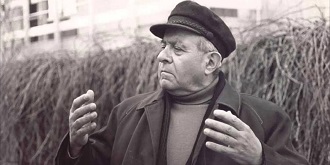
Ahmed Arif (21 april 1927 – 2 juni 1991)
De Duitse literatuurwetenschapper en musicus Michael Mann werd als jongste kind van Thomas en Katia Mann geboren op 21 april 1919 in München. Zie ook alle tags voor Michael Mann op dit blog.
Uit: Die Manns. Geschichte einer Familie (door Tilmann Lahme)
„Michael Mann ist zusammen mit seiner Frau Gret von Zürich nach England gereist. Er schickt seiner Mutter einen Bericht über seine Zeit in der Schweiz, darüber, dass es gar nicht einfach gewesen sei, nach England hineinzukommen, und von der hysterischen Stimmung und den grausigen Szenen, die er im englischen Konsulat in Brüssel erlebt habe, von zahlreichen deutschen Juden, die dort um ein Visum gefleht hätten und die brutal abgewiesen worden seien, »die armen armen Leute«. Geld habe ihm die Mutter ja keines mehr geschickt nach seiner letzten brieflichen Forderung, da habe er sich welches bei einem Schweizer Bekannten der Familie geliehen (und zwar doppelt so viel, wie er von ihr hatte haben wollen). Jetzt brauche er aber dringend: Geld; und zwar »viel Geld«, für den Fall zum Beispiel, dass er kurzfristig eine Überfahrt nach Amerika buchen müsse. Eigentlich will er in England und bei Flesch bleiben, auch im Kriegsfall, aber ein Finanzpolster sei dennoch notwendigisst! Katia Mann schickt Geld.”
(…)
Michael Mann meldet sich mit einem Brief. Gret und er seien »gerettet«. Zusammen mit dem Geigenlehrer Flesch und einigen von seinen Schülern sind sie nach Wales ausgewichen. Sie wohnen in einem feinen Privathotel. Gret helfe im Hotelbetrieb, während er sich auf sein Geigenspiel konzentriere. Nach Amerika möchte Michael nicht fahren, das sei ja jetzt »unsinnig«.
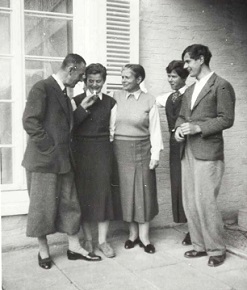
Michael Mann (21 april 1919 – 1 januari 1977)
V.l.n.r. Thomas, Elisabeth, Katia, Monika en Michael Mann, 1935 in Küsnacht
De Engelse schrijver John Mortimer werd geboren op 21 april 1923 in Londen. Zie ook alle tags voor John Mortimer op dit blog.
Uit: Paradise Postponed
“She felt a tightness in her chest and sent for Dr Simcox.
‘What’s the trouble?’
‘Look out there, that’s the trouble! It’s so green and quiet and it’s always bloody raining.’
‘That’s England, Mrs Mallard-Greene. I’m afraid there’s no known cure for it.”
(…)
“You can’t change people. You know that. You can’t make them stop hating each other, or longing to blow up the world, not by walking through the rain and singing to a small guitar. Most you can do for them is pull them out of the womb, thump them on the backside and let them get on with it.”
(…)
“In the middle of the swinging sixties people in England were apparently under some sort of obligation to have a good time and most of them didn’t. A Russian and an American walked about in space to no one’s particular advantage. The Beatles received their British Empire medals and, so it was said, smoked cannabis in the lavatories at Buckingham Palace. American aeroplanes were bombing Vietnam, but no one seemed to talk about the nuclear holocaust any more.”

John Mortimer (21 april 1923 – 16 januari 2009)
Cover audioboek
Zie voor nog meer schrijvers van de 21e april ook mijn vorige blog van vandaag.

